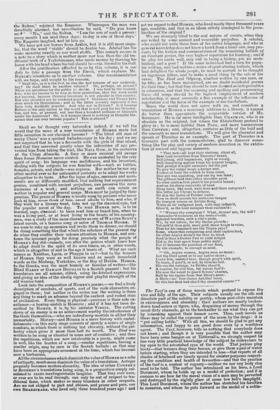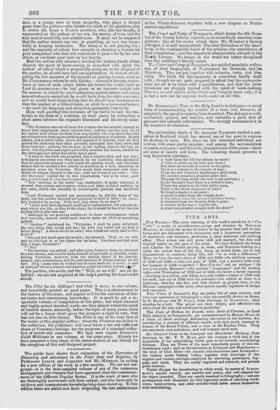The Turf is one of those novels which pretend to
expose the. vice and folly of the age. Their subjects usually are the idle and dissolute part of the nobility or gentry, whom post-obits maintain in extravagance and absurdity : their authors are mostly broken- down toad-eaters or tigers, who, despairing of money through the usual dirty channels, go to the bookseller to see what they can get by informing against their former users. Thus, such novels as these may be called the exposure of the scum by the dregs : it is "pot calling kettle." With all this, we should be glad to get any information, and happy to see good done even by a worthless agent. The Turf, however, tells us nothing that everybody does not know ; and though it is very possible that the author may have been some hanger-on at Tattersall's, we strongly suspect he has very little practical knowledge of the subject he endeavours to lay open to the astonished eyes of the world. That jockies play booty—that trainers drug their horses, or give them a pail of water before starting, when they are intended to lose—that reports of all shades of falsehood are hourly spread for sinister purposes respect- ing the condition and health of favourites—and that the practice of the turf is a contest of roguery—neither we nor any body else need to be told. The author has introduced as his hero, a Lord Dorimont, whom he holds up as a model of perfection; and it is curious to see how far the moral vision of a man may be perverted and destroyed by the nightly glare of some low hell's lamplight. This Lord Dorimont, whom the author has stretched his faculties to conceive, and whom he puts forward as the model of a noble- man, is a young man of large property, who plays a deeper game than the jockies—who breaks the bank of' the gamblers and, to crown all, keeps a French countess, who, like her keeptr, is represented as the pattern of her sex, the martyr of love, and the very soul of sensibility and amiableness. It must not be supposed that the author detects any vice in gambling, i or sees any immo- rality in keeping mistresses. The crime is n not playing fair ; and the impurity of unholy love consists in choosing a woman for your companion who does not contribute to your eclat by her con- dition, or vindicate your taste by her beauty. Had the author with clearness detailed the various frauds which degrade the sport of horse-racing, or described with spirit the Contest of villany which is perpetually going on, to the disgrace of the parties, he should have had our approbation. If, instead of ridi- culing the low manners of the keepers of gaming-houses, such as Mr. Crtocaroan,whom he calls H ooky,— instead of drawing carica- tures of men of rank, whose follies are before the world, such as Lord HARBOROUGH,—he had given us an accurate insight into the manner in which the great conspiracy against minors and young men of fortune is carried on, he would have done the state a service; and we would have forgiven him that he should have been no more than the marker at a billiard-table, or clerk to a horse-auctioneer, .—for such his language and education pronounce him to be. How well qualified this historian of the turf is to cast his ma- terials in the form of a romance, we shall prove by extracting a short scene between the exquisite Dorimont and his lovely coun- tess. .
"The Countess was one of those few women who are sensible enough to know that compliment never returns love ; and she was the only one of her nation with whom we have been acquainted, who was above the little art of bouderie to keep up an artificial game of jealousy or of interest. Gentle .silence, and a colder smile, which she appeared to conceal, were all that proved the discovery that other pursuits estranged him daily more and more from her ; jealousy had no part in her feeling, because she had no rival; but dejection and regret powerfully assailed her bosom, excited by the estrangement which had lately taken place.
"A turn in the Park was proposed, but it was too dark and too late ; a shopping excursion was then named by his Lordship, who calculated that an opportune present would dispel the passing cloud, and therefore hinted that he wanted a few articles of jewellery as a lure, intending to purchase some for Victorine. This would have succeeded with nine- tenths of women situated as she was ; with her it was of no value; Mon cher Dorintont,' replied she to this observation, vas Si Cu veu ; pour tnoi, je n'ai besoin de Tien dons le monde?
"This nothing in the world' was conclusive; it spoke volumes ; it showed that crowns and sceptres, riches and titles, weighed nothing in her scale, which was intended to counterpoise genuine and unaltered love.
"Lord Dorimont wanted not penetration ; he felt the force of the reply, but was neither' inclined nor prepared to meet it fairly ; he these- fore evaded it by saying, Well, love, and where do we dine ?'
" ' I have sent three apologies motived in indisposition, but you can ac- cept which you like, or dine at the club ; for it would be too triste for you to dine tete-a-tete with me.'
"Although he was growing indifferent to those enchantments which first won him, honour called upon him to make an effort at something gallant. " Parbleu!' exclaimed he, Victorine, I shall be quite delighted; the very thing that would suit me ; by Jove you could not propose a better thing ! A site-a-tits to be sure; who would not enjoy such a tiite- A-tac
" She put her hand upon his mouth ; he resumed, Well, so we will, and we will look in at the Opera for an hour. You have not lent your box, I hope, Victorine ?'
" No.'
"The business was settled ; and after going home to dress, he returned to a late dinner, and tried to make himself as agreeable as possible, enter. taining Victonne, however, with the darling object of his pursuit, namely, play transactions, and his anticipations of future success on the turf. At ti same time he wished her to issue cards for a soirée ; a sort of ambigu; where a concert and dancing might introduce private ply."
The parbleu, tete-a-tete, and the" Well, so we will," are all de- lightful: we are not surprised at the lady's putting her hand on his mouth.



























 Previous page
Previous page